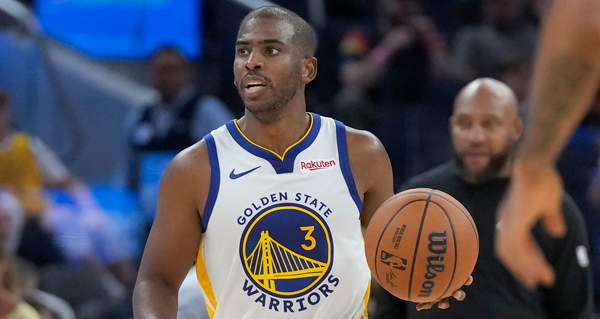Chris Paul is submerged. Deep into athletic old age, he gazes on a panorama of places he can no longer visit. The shot comes and goes, spaces close more quickly than they used to. Each minute on the court is heavier, somehow. He can accomplish only what he sets about doing deliberately, which is quite a lot, for a 38-year-old. He gets assists just rolling out of bed; he still knows how to defend, even if the body is less than willing. But Paul spent the bulk of his career controlling entire games. He now leads a second unit; he came off the bench for the first time in his career this past Sunday night. With the starters, he drifts, helps out where he can.
Deep into his itinerancy. The Clippers are Chris Paul's team, right? His presence legitimized that franchise. (No small feat.) You see him wearing the white jersey with the blue and red script, when you picture him in your mind. Lobbing it up to DeAndre Jordan. (Red-assedly lecturing DeAndre Jordan.) But it's not a thoroughly settled matter. He spent six seasons in Los Angeles. His career stretches much further than that. He was a New Orleans Hornet, which was never really a thing and has since ceased to exist. He wingmanned for James Harden in Houston more effectively than you might have guessed he would, and then exactly as you might have guessed. Harden ran him out of town. He had that lovely gap year with the Thunder—a return, oddly enough, to Oklahoma City. He's not a Sun, despite nearly winning a title in Phoenix.
Paul certainly doesn't belong in Golden State. The whole situation has a video game transaction feel. Warriors fans loathe him for the usual reasons—the on-court lawyering and dirty play, his powerful sense of grievance—but especially because he was the last player to push Steph Curry around, before Curry ascended and became unbullyable. And those Rockets-Warriors playoff tussles were acrimonious. You can't bring yourself to hate James Harden; what develops as he feints and flails and steps to the line for the 12th time is more like extra-strength annoyance. Chris Paul inspires real anger. He is an argument that goes on forever.
Deep into history. All the most consequential moments of Chris Paul's career are in the rearview. The canceled Lakers trade, the meltdown against the Thunder in 2014, the hamstring injury with the Rockets in 2018, losing four straight in the 2021 Finals. A deep playoff run with the Warriors, even a championship, might enhance our appreciation of Paul, but success at this late stage is different—in short, less meaningful—than it would have been three, five, or ten years ago. The achievement will belong to someone else.
There is little enmity between players, anymore. They borrow wisdom from politics: no permanent friends, no permanent enemies. They all live in the same Los Angeles neighborhoods in the summer; they are all pitchmen for the same sorts of dubious goods. The league has no M.J. and Isiah-like rift. The stars generally get along. The villains are minor characters, easily exposed and discarded. Yet it still feels strange that Chris Paul has allowed himself to choose Golden State. It speaks to both to his desperation and his competitiveness. On the one hand, chasing a ring on Steph Curry's team is embarrassing; on the other, he still wants to play basketball at age 38 but would rather be retired than simply clocking another season for a squad that doesn't have a championship in mind. The Warriors were a brave decision, in a way. Shameless and brave.
The NBA has been thoroughly poisoned by legacy talk, which is itself not often a discussion of legacy—the shape and quality of an outstanding player's career, its broader influence, its dialogue with other outstanding careers and the league itself—so much as moving players up and down a set of cosmic rankings, a Forbes list from hell. We count up the good playoff performances and the rings and the All-NBA teams, and that is the end of that. Applying that cursed arithmetic, Chris Paul is something like the 30th-best player in league history. That number is the faint outline of nearly two decades of ball.
Here is something else: among the great players of his generation, Chris Paul stands out as its most discouraged figure. Kevin Durant, terminally unhappy and at bottom maybe a bit regretful, did at least win a pair of titles starring on the best basketball team ever assembled. Carmelo Anthony didn't care enough to be truly frustrated. Jimmy Butler is comforted by his myth, Russell Westbrook by his mania. James Harden has dissociative superpowers. Paul, frowning atop the heap, has been precisely good enough, well-traveled enough, vocal enough, unlucky enough, bad enough in enough big moments, to distinguish himself in a way no one does on purpose. He is heroically dour and denigrated and impotent. In part because he's been so special for so many years.
History isn't everything. There is—still and finally—the work. Whatever Chris Paul is as a player at age 38, what he adds to a Golden State team that, as long as Steph Curry is still functioning at peak efficiency, has a credible if long shot at winning it all. This is not unimportant, particularly for Warriors fans who suffered through Jordan Poole's struggles last season. Putting to one side their long-running distaste for the guy, losing themselves in the energy of a close game, they can root for Chris Paul, celebrate his contributions. But the work, for anybody of Paul's stature, with as much data as he's logged in our minds, doesn't exist in a vacuum. It can't. We are in too deep with him. Redefinion, at this late stage, is impossible.



